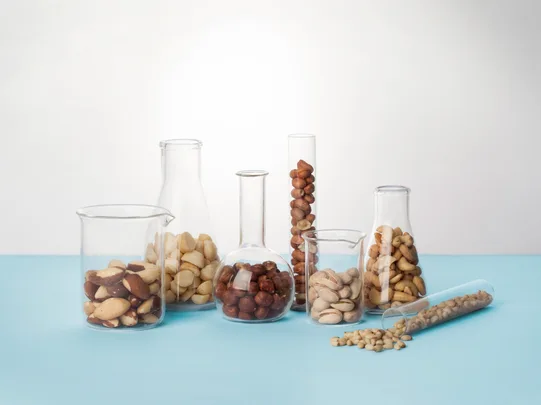Brazil nuts
To reduce the risk of heart disease and cancer
Just one Brazil nut contains the full recommended daily intake of selenium, which is known to help prevent cellular damage and assists in reducing the risk of heart disease and cancer. Brazil nuts are high in kilojoules, so a little goes a long way. Try limiting yourself to one nut a day and you’ll reap all the health benefits without bursting the calorie quota. Brazil nuts are high in saturated fat and go off quickly (reducing their nutritional value) so be sure to store them in the fridge.
Hazelnuts
To keep muscle tissue healthy
Hazelnuts are rich in the B-complex vitamin folate, which is great for expectant mothers and helps to prevent megaloblastic anaemia. They are also rich in potassium, calcium, magnesium and vitamin E. A small portion of hazelnuts can help regulate calcium, which encourages muscle contraction and helps prevent muscle tension, soreness, spasm, cramps and fatigue. Hazelnuts are also rich in B vitamins which the body uses to dismantle proteins, fats and carbohydrates. Try cooking with hazelnut oil to help regulate blood pressure and to add a delicious nutty flavour to your food
Peanuts
To feed the brain
Peanuts are actually legumes and they are crammed with monounsaturated fats, which have a long list of health benefits including assisting with arthritis pain, lowering the risk of stroke, preventing nerve disease and Alzheimer’s disease. Just 100g of peanuts provides 85 per cent of the daily recommended intake of niacin, which improves blood flow to the brain. Recent research shows that peanuts contain high levels of polyphenolic antioxidants, which have been known to reduce the risk of stomach cancer. If the high fat content of peanuts is a concern, simply boil them before eating. This reduces the calorie content and increases antioxidant levels.
Pistachios
To regulate red blood cell production
Pistachios contain zero sodium, so they’re a great choice if you’re trying to curb your salt intake. Eating 100g of pistachios provides 144 per cent of your daily intake of copper, which is essential for healthy neuro-transmission, metabolism and red blood cell production. The nuts are also packed with enough fibre to get your digestion back on track. Pistachios are rich in vitamin E and cooking with pistachio oil is known to encourage glowing skin.
Cashew nuts
To maintain eye health
Creamy cashews are packed with heart-friendly monounsaturated fatty acids which are vital for reducing cholesterol. Cashews are rich in magnesium, potassium, copper, iron, zinc and selenium, which have many health benefits and are known to help prevent disease and cancer. Cashews also contain zeaxanthin, a carotenoid which helps to reduce the risk of light-induced oxidative damage in the eye which can lead to macular degeneration.
Pine nuts
To suppress appetite
Recent research shows the high levels of pinolenic acid found in pine nuts can help to curb appetite by releasing hunger-suppressing enzymes. Pine nuts (which are not actually nuts but the seeds of the female cone in a pine tree) are recognised as one of the highest sources of magnesium and adding a small amount to salads can help fight against infection and disease. Pine nuts are also rich in monounsaturated fatty acids, such as oleic acid which helps to lower bad cholesterol.
Nut alternatives
If you dislike nuts or are wary of the kilojoule content, there are other foods that are similarly rich in nutrients. Try eating sunflower and pumpkin seeds, avocado and olives for a dose of healthy fats, while chickpeas and lentils are great sources fibre and protein.



.jpg?resize=380%2C285)







